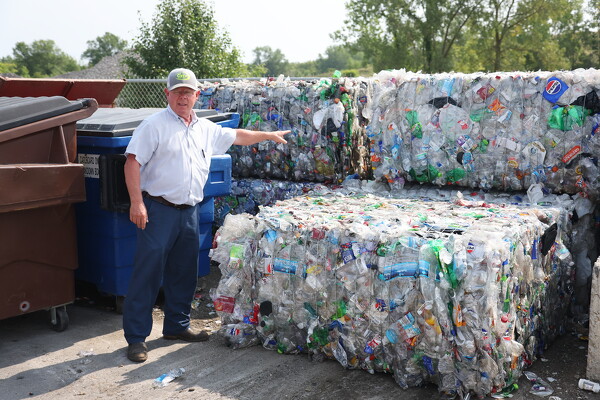
District Coordinator for Auglaize County Recycling Scott Cisco explains the journey materials will go through after arriving at the facility in St. Marys.
ST. MARYS - Although the Auglaize County Recycling is a rather small facility, its impact on the community and Mother Nature is considerable.
Scott Cisco, the 61-year-old district coordinator for the recycling center, is proud of the facility's proven track record of turning refuse into commodities.
"My predecessor did approximately 4.5 million pounds of recycling a year," Cisco said. "Right now, we're doing somewhere between 11 and 12 million pounds a year. More people are buying into recycling. They're finding out that the more they recycle, the less garbage they have and people are being conscientious as what's going to the landfill."
The facility, located at 15502 St. Marys River Road, accepts glass, tin, aluminum, cardboard, mixed paper, certain types of plastics, used cooking oil and grease, PVC piping, plastic bags, vinyl siding and other household hazardous items.
Certain items that fall under those categories, though, are restricted.
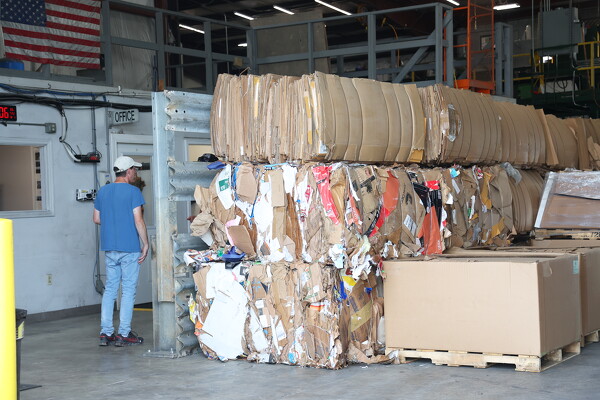
Bales of cardboard stand near the entrance into the facility. Cardboard and paper are sent to Pratt Industries, a paper mill in Wapakoneta.
For example, the facility accepts all glass bottles and jars but no ceramics, cooking glass, window glass or auto glass. All lids must be removed.
The center accepts aluminum cans, tin and steel food cans, empty aerosol cans, foil and pie pans and scrap steel.
Cardboard should be broken down.
Mixed paper, which is accepted, includes newspapers, slick ads, clean pizza boxes, phone books, shredded paper, office paper, junk mail, paper board, meaning cereal boxes, magazines, cartons, office paper, paper bags and envelopes.
The facility accepts certain categories of plastic. Plastic products are usually labeled with a number that indicates the type of resin used to make them and whether they can be recycled, according to the Public Broadcasting Service.
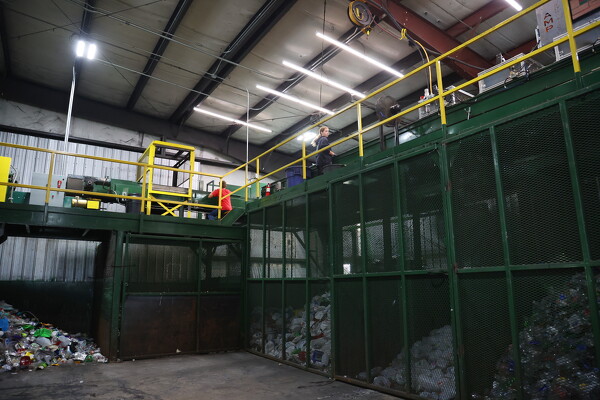
With AI technology, materials are scanned by a sorting machine and seperated into different categories.
Auglaize County Recycling accepts Nos. 1, 2 and 5 plastics. No. 1 plastic includes soft drink, water and other beverage bottles. All lids can be kept on when using one of the center's 12 drop-off locations.
No. 2 plastic includes milk and water jugs, laundry detergents, shampoo bottles and motor oil containers. No. 5 plastic includes deli soups, syrup, yogurt, sour cream and butter containers, according to information provided by the facility.
Almost all of the items accepted by the facility end up recycled or repurposed.
"We're a small to medium-sized facility," Cisco said. "We're not like a big city where we're collecting all this material. For our county, it's (recycling) very important. We only throw away four yards of material that's actually trash a week. We find a home for everything else that we collect."
Recycling is important for numerous reasons, including keeping materials out of landfills.
"Auglaize County has no landfill and Mercer County now has no landfill," Cisco said. "To get rid of this stuff is very expensive. So that is a great way to curb your garbage cost."
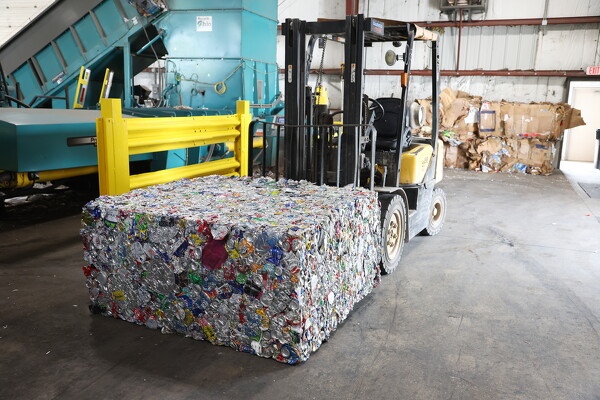
Bales of aluminum like this are sold to different vendors throughout the area.
Cisco said the cardboard and paper are baled and sent to Pratt Industries, a paper mill in Wapakoneta. Shredded paper and office documents are sent to another mill that produces paper towels and toilet paper.
The tin goes to OmniSource, another recycling center in St. Marys. The aluminum is sold to different vendors. The plastic, however, is sorted further.
Colored No. 2 plastics are sent to a facility that makes the same kind of material, and natural No. 2 plastics - white or clear plastics - go to another facility, he said.
Natural plastic is more valuable because it can be dyed to any color. No. 1 plastic is sent to a facility that makes strapping to bind up boxes or water bottles. Certain films, like bubble wrap, can be made into plastic bumpers that are placed behind guardrails.
The center accepts plastic bags. Another company grinds the bags, extracting oil and another flammable liquid to fuel their burners, Cisco said. The remaining ash is used by farmers, who apply it to their fields.
People can drop off household hazardous items such as paint, chemicals, fertilizers, motor oil, batteries, gasoline, lightbulbs, tires and electronics by appointment between 7 a.m.-3 p.m. Monday-Friday, Cisco said.
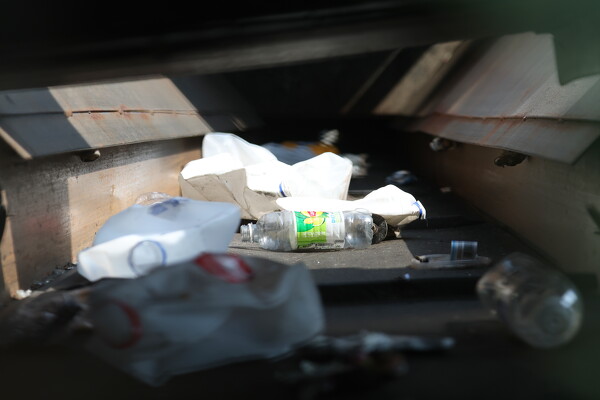
Materials travel down a conveyor belt.
Cisco has 10 employees and because of AI technology, no one has to sit around for hours sorting materials by hand.
When the materials are dumped onto a conveyor belt, the sorting machine uses AI software to read, filter and separate them into different categories, such as aluminum or plastic.
He said the technology has saved the facility time and manpower. Because it's relatively new, Cisco said it will get better the more it learns and adapts.
Auglaize County Recycling started in 2013 and Cisco came on board in 2014. He said the amount of material the facility recycles is massive, especially given how small the building is.
"Honestly, people don't realize," he said. "After they start seeing the benefits of it, when they find out that they could cut their trash collection in half, I mean, that's big dollars. Then they start really paying attention. It really benefits the whole county."
Cisco said when larger items get onto the conveyor belt, it jams the equipment, sometimes resulting in costly damage.
"Our biggest deal here today is trying to get people to read the signage," he said. "Our worst spot is the tin, aluminum and plastic. If you have big items, we will be more than happy to accept them, but we want them brought to our door. It just makes a world of difference for our sort line."
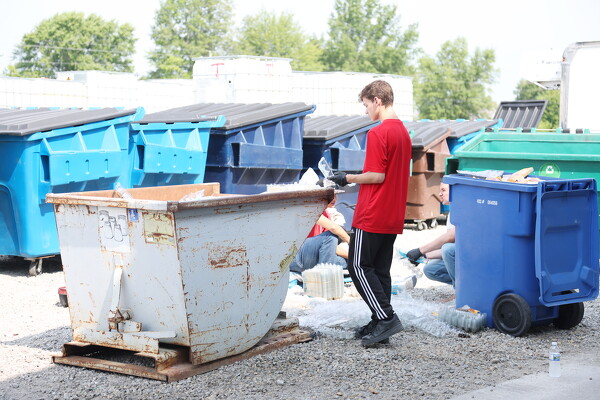
Employees at the Auglaize County Recycling facility in St. Marys cut plastic egg cartons.
Bigger items should be brought to the front door, not at a drop-off location, because the bulky items slow down the process.
For example, PVC/CPVC piping and vinyl siding are accepted, but they must be broken down into 4-foot sections and dropped off at the facility.
For more information, call 419-394-1270 or visit the facility's Facebook page.